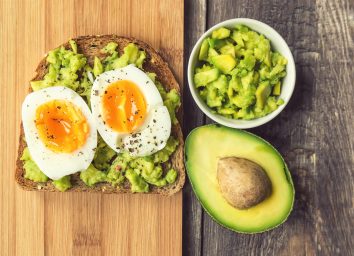This Unexpected Vitamin May Help Weaken COVID Symptoms

By this point, several published research papers and clinical trials have shown that vitamins D and C, as well as minerals such as zinc and magnesium, may reduce the severity of symptoms in COVID-19 patients. Now, one researcher is calling on scientists to explore another helpful vitamin that may have been overlooked.
In an opinion article published in the journal Frontiers in Nutrition, Thanutchaporn Kumrungsee, an assistant professor at Hiroshima University in Japan, proposed that vitamin B6 could play a pivotal role in fighting the novel coronavirus. (Related: The One Vitamin Doctors Are Urging Everyone to Take Right Now.)
“There is growing evidence that vitamin B6 exerts a protective effect against chronic diseases such as cardiovascular diseases (CVD) and diabetes by suppressing inflammation, inflammasomes, oxidative stress, and carbonyl stress,” the article reads. “Additionally, vitamin B6 deficiency is associated with lower immune function and higher susceptibility to viral infection.”
However, some health experts remain suspicious—and for good reason. Ali Webster, PhD, RD, and director of research and nutrition communications at the International Food Information Council, says it’s still too soon to determine whether or not the vitamin could help lower your risk of experiencing adverse COVID-19 symptoms.
“There are plausible biological mechanisms for it doing so, and low levels of B6 in the body are associated with a weakened immune system,” she says. “But often, the promise of a positive impact is there but the outcome of well-designed studies is disappointing.”
Webster explains that the research on taking vitamin B6 in supplement form to reduce the risk for heart disease, stroke, certain types of cancer, and even cognitive decline is a bit inconclusive, as well.
“More research is needed in each of these areas in addition to the work to determine its effect on COVID-19 severity,” she adds.
Brittany Busse, MD, associate medical director at WorkCare, agrees that more research is needed. However, Busse notes that vitamin B6 is known to have an anti-inflammatory effect on the body, which could help you in both preventing and combating adverse COVID-19 symptoms.
“There are a lot of vitamins that can help decrease inflammation, potentially,” she says. “And B6 is one of them.”
Busse also adds that the severity of COVID-19 is based largely on how much inflammation your body creates in response to the virus. Thus, it’s key to keep inflammation levels low by eating a diet that’s rich in fruits, vegetables, and legumes; engaging in regular, moderate exercise; getting plenty of sleep; and managing stress.
“In a good, normal state of health, we would want to have as little inflammation in our bodies as possible before becoming infected with COVID,” she says. “Then, we do what we can once you become sick to try and reduce your body’s over-reactiveness to the virus.”
Similar to vitamins D and K, Busse says vitamin B6 may operate as an anti-inflammatory mechanism against the cytokine storm—which stokes inflammation—that occurs upon infection. Having a good baseline level of vitamin B6, in addition to vitamins C, D, K, and minerals such as zinc and magnesium, could ultimately be really helpful should you get the virus.
Until more research is conducted—and before you go and purchase a vitamin B6 supplement—it may be easier to turn to food to make sure you’re getting enough of the vitamin. Found in animal protein like beef and poultry, as well as plant-based sources like potatoes and even fortified cereals, vitamin B6 aids the body in protein metabolism in addition to supporting cognitive development and immune function, Webster says.
If you’re going to take a vitamin B6 supplement, Busse says you should only take the recommended amount. Overdosing on the vitamin could lead to bad health outcomes.
“Focus on diet first,” she says. “If you’re having a good well-balanced diet, your body absorbs vitamins and minerals better.”
For more, be sure to check out 5 Grocery Store Items That Help You Combat COVID.








